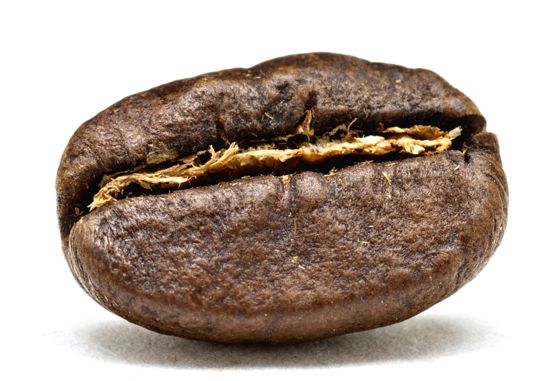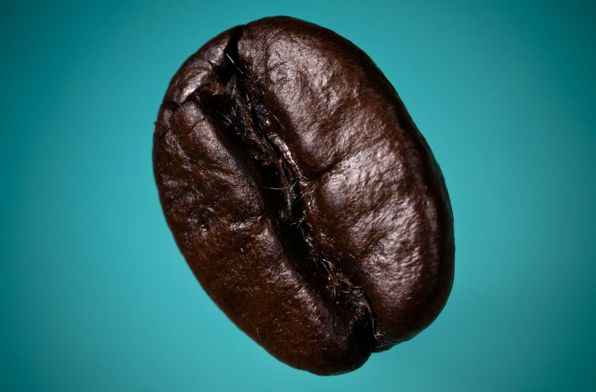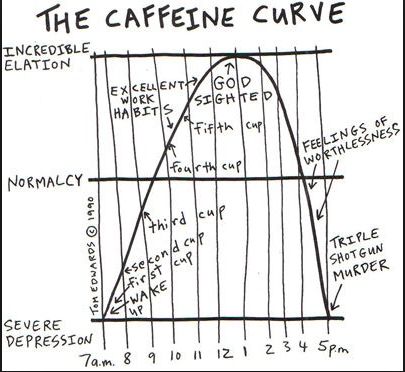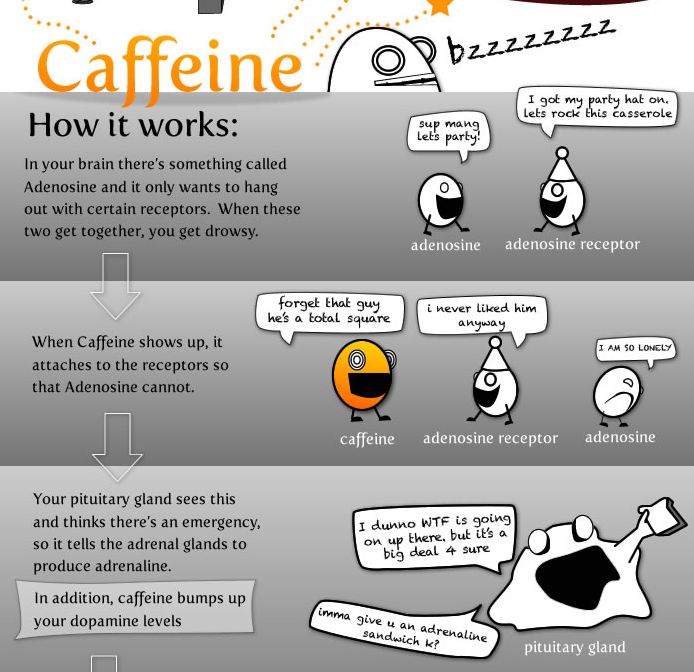All our favourite blogs have done a post on caffeine in coffee, how much is too much, how long does it stay in your system, is it good for you etc etc ad nauseum. It's difficult to know what the facts really are.
Through absolutely no scientific means, acting as your filter, we at TheCoffeeMag feel that these are the 5 'facts' (READ: completely-subject-to-change-when-the-next-study-comes-out-musings) that are most important to the person who loves coffee. So yes, they're a little biased. We accept full responsibility for that.
1. Decaf does not mean caffeine free.
Ha! To all you who drink decaf for whatever reason. Read up on the numbers
here. If your aim is to cut down on caffeine but you still want to have 4 cups of coffee a day, then by all means continue to drink 4 cups of a decaffeinated bean that has been processed (most likely using awful chemicals, but hopefully using the CO2 method) instead of one seriously good cup of caffeinated coffee. It's up to you really and we know some of you have legitimate reasons, but now you know how we feel.
Read
Jake Easton's investigation into decaf here
2. Dark roast coffees actually have less caffeine than lighter roasts.
Some people make the assumption that a dark roast is 'stronger' coffee that gives you more of a kick. They are sorely mistaken. In fact, the longer the coffee is roasted the more caffeine is burnt off. The caffeine is stored in the pale strip of the bean as seen below, which gets less and less the darker you roast. So just because dark roasts taste stronger, ie more bitter, does not mean they are more caffeinated.
3. Your body becomes addicted to caffeine (duh!). The withdrawals can begin within 12 to 24 hours and last as long as NINE days, depending on how much coffee you consume.
Basically, our advice to you here, is just don't stop, ever.
4. Caffeine's high begins almost immediately and the length of the time it spends in your body is completely dependant on your own body's metabolism.
"Caffeine is fully absorbed by the digestive system in approximately 45 minutes. Typically, the peak of concentration is 15 to 120 minutes after caffeine is consumed. Caffeine stays in the bodies of men for five to nine hours, but the amount of time is reduced by 30 to 50 percent in smokers. The length of stay for caffeine in women using oral contraceptives is approximately 12 to 15 hours, and can be as long as 15 hours in pregnant women as well, according to the
Coffee Science Information Centre and the International Coffee Organization."
SIDE NOTE FACT: Because your body metabolises milk slower, the caffeine in a cup of black filter coffee or an espresso will work through your system faster than that contained in a milky cappuccino. Just saying.
5. Does coffee increase productivity? The short answer is YES!
But don't be fooled:
"The general consensus on caffeine studies shows that it can enhance work output, but mainly in certain types of work. For tired people who are doing work that's relatively straightforward, that doesn't require lots of subtle or abstract thinking, coffee has been shown to help increase output and quality. Caffeine has also been seen to improve memory creation and retention when it comes to "declarative memory," the kind students use to remember lists or answers to exam questions".
So it may increase quantity but not quality of the work. Just a heads up.
And then, for just a little bit of actual scientific fact: how does coffee compare to other caffeinated substances? And how does caffeine actually work? This little BBC video explains it pretty well.
But this is still our favourite, courtesy of
The Oatmeal:






